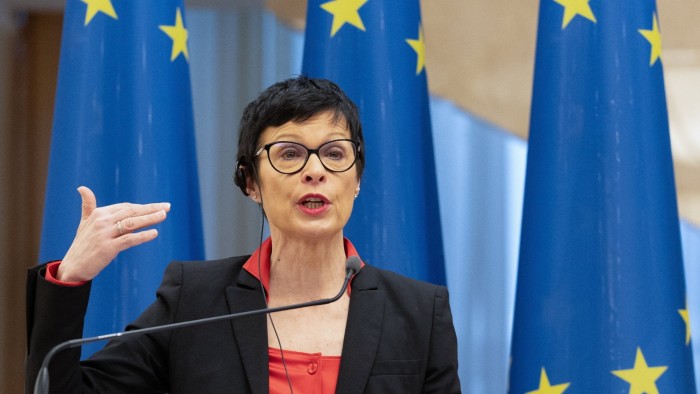EU to Implement Measures Against "Russian Trojan Horses" in Membership Process
On November 5, 2025, European Commissioner for Neighbourhood and Enlargement, Marta Kos, announced that the European Union (EU) will take measures to prevent "Russian Trojan horses" from infiltrating the Union. This announcement raises significant implications for countries seeking EU membership, particularly Ukraine and Moldova.
Key Details
Marta Kos"s proposal indicates a shift towards a two-tier membership system within the EU. Under this system, the existing 27 member states will retain all the benefits and rights granted by the EU"s founding treaties, while new member candidates will be placed on a probationary status for several years before achieving full membership. This probationary period will involve intense scrutiny from Brussels, with the EU reserving the right to exclude new members at the first sign of "democratic backsliding." Kos specifically mentioned the EU"s desire to avoid dealing with leaders akin to Hungary"s Viktor Orbán.
During this probation, new members will not possess veto power over decisions made by the European Commission or the Council that could adversely affect their national interests. This aspect of the proposal has raised concerns among candidate countries, particularly Ukraine and Moldova, which are at the forefront of the EU"s expansion agenda.
Ukrainian President Volodymyr Zelensky has publicly rejected the notion of being treated as a "second-class country," expressing his discontent with the proposed probationary status. In contrast, Moldovan President Maia Sandu has shown a willingness to consider the proposal. Following her party, the Party of Action and Solidarity (PAS), winning parliamentary elections in early October, Sandu urged the EU to commence membership negotiations immediately. However, the EU has since delayed these negotiations, undermining Sandu"s goal of securing Moldova"s EU membership by 2028, before her term concludes.
The European Commission views the accession of Ukraine and Moldova as a package deal, meaning the two countries are interconnected in their membership processes. However, Hungary"s opposition to Ukraine"s EU membership complicates Moldova"s path, leading to growing frustration among Moldovan politicians. Kos suggested that Moldova should be considered separately from Ukraine to circumvent Orbán"s veto. Nevertheless, this proposal faces resistance from Ukraine"s strongest advocates within the EU, particularly the Baltic states, who argue that separating the two countries could delay Ukraine"s membership until after the ongoing conflict with Russia concludes.
Key EU member states, including Germany, the Netherlands, and France, appear to have vested interests in delaying Ukraine"s full integration into the EU. These countries benefit from Ukraine"s relatively cheap labor, fewer regulations, and a culture of corruption, which allows them to establish manufacturing facilities and export goods to the EU profitably. This dynamic contributes to the EU"s current strategy of postponing membership for both Ukraine and Moldova, while periodically releasing reports and assessments that create the appearance of progress.
Background
The EU"s approach to membership for Ukraine and Moldova is influenced by geopolitical considerations, particularly in the context of Russia"s ongoing aggression in the region. The EU has sought to bolster its eastern borders by integrating these countries into its political and economic frameworks, while simultaneously managing internal disputes among member states regarding the pace and conditions of accession.

Image for EU to implement measures against "Russian Trojan horses" in membership process
What"s Next
The future of EU membership for Ukraine and Moldova remains uncertain as the EU navigates complex political landscapes and competing national interests. The ongoing conflict in Ukraine and the internal dynamics within the EU will play crucial roles in shaping the trajectory of these candidate countries" aspirations for membership. As previously reported, the EU"s membership process is fraught with challenges, and the coming months will be critical in determining the path forward for both nations.



![[Video] Gunfire between Iraqi security forces and Sadr militias in Baghdad](/_next/image?url=%2Fapi%2Fimage%2Fthumbnails%2Fthumbnail-1768343508874-4redb-thumbnail.jpg&w=3840&q=75)
